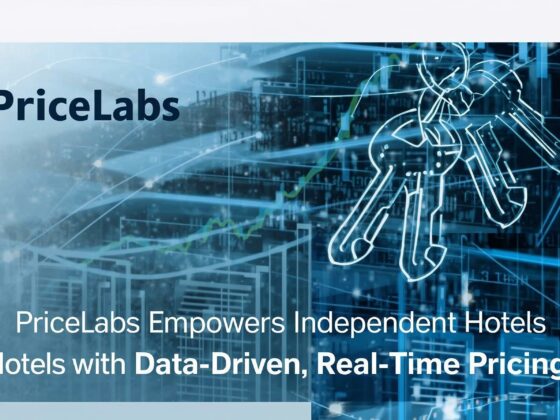What do productive teams do better than others? They ride the river. Why overtourism is actually fake news. OpenAI commerce and more.
Hello,
Some times I put down my thoughts on random things like getting work done. I figured I’d share them here. I hope it interests you. Plus there’s quite a lot of curation this week.
PS: The most complete hotel brands chart ever made, we included a form to submit any errors, missing brands etc.
Best, Martin
Klairhaus, the perfect employee and customer gifts. Quality, crafted, every day items for the office. Find out more ➛
Emotion, AI, and Humans
I think super-personalization with AI still has a long way to go. But AI is not just about efficiency and personalization. Sébastien Félix argues that AI frees teams from repetitive work so they can focus on people. Adoption is a cultural challenge, not a technical one.
AI AND HOSPITALITY⁺
Google Hotel Search Pressure
Only about 8% of the Google Travel search page is organic results. Everything else is paid (PSA: Amazon is almost the same). This creates real pressure on hotels. In the end, people probably don’t care what is organic or sponsored, but they do care about fewer, clearer choices.
GOOGLE HOTEL SEARCH
About me: I'm a fractional CMO for large travel technology companies helping turn them into industry leaders. I'm also the co-founder of 10minutes.news a hotel news media that is unsensational, factual and keeps hoteliers updated on the industry. Pricing Makes or Breaks
A hotel has the product, the photography and decoration, the marketing, but if the price is wrong, it fails. An interesting view from outside the industry on pricing and the scale of marketing. The claim is that long-term growth is about aligning with consumer purchasing power, not pushing harder on ads. But maybe the latter brings the former?
BRAND PRICING
Like this? Share it!
“Anti-Funnel Booking”
A great friend Simone shared that, conversational AI and platforms like TikTok Go are collapsing discovery and booking into one seamless experience. That the old funnel model doesn’t hold anymore. Funnels work at a macro level, every micro level booking is different. But mostly I just don’t see how travel can be an impulse buy. There’s a very very small segment of people for whom that might work.
ANTI-FUNNEL ERA
Overtourism Myths
I still hate the word, but I’ll deal with that. A series of rather interesting analysis of overtourism, something more scientific than my opinions. Overtourism is less about constant crowds and more about peaks. Bruges shows how concentrating tourists can create its own perception of overcrowding. Solutions like AI models, dynamic pricing, and off-season investment could help.
OVERTOURISM IS FAKE PART2 PART3 PART4
When AI Outperforms Humans
Hubspot has an AI service rep, it apparently works really well and shows how AI can actually improve service when done right. It gives information quickly, freeing humans to focus on what matters. I noticed the help AI-bot on Shopify is also really good. It can actually look at your account and tell you what you did wrong. Not just refer you to a knowledge-base article. The fear that AI dehumanizes is real, but the benefits are becoming clearer. Also at Navan apparently AI handles 50% of corporate bookings.
AI CUSTOMER SERVICE AI TRAVEL MANAGEMENT
OpenAI Adds In-App Checkout
ChatGPT now lets shoppers check out directly from Etsy and Shopify. Not agentic commerce yet, since decisions are still manual. But it makes ChatGPT a serious retail platform. Amazon and Walmart are notably absent, as predicted – I think they will do everything they can to make this not succeed, as will OTAs.
CHATGPT SHOPPING
Loyalty Without Recognition
I personally believe (but this is not scientific) that 80% of loyalty is based on recognition. Yet, hotels often fail at loyalty because they don’t recognize returning guests. Gas stations do it better with integrated systems. Fixing loyalty requires integrated data, some AI, and training staff. Not just more rewards.
LOYALTY RECOGNITION
Podcast: I was invited to talk about AI in hospitality on this podcast, along with many other great industry thought leaders. A great discussion, we didn't agree on everything. Which made it more interesting. Opinion
Flow: The River That Gets Work Done
People talk about “being in the flow” as if it’s some zen productivity state. That’s nice, but what I mean by flow is much more practical: things moving. From left to right, down the funnel, across the team. Progress happens because work doesn’t get stuck.
Think of it as a river. Once you’re in, you go downstream. You can nudge the current, steer it a little left or right, improve its path, even create a side creek. But you keep moving. The problem is, in business we’ve built a culture where sounding smart often means pointing out why something won’t work (justifying decisions, failures etc is in the same bucket). That breaks the flow.
Take a typical B2B marketing meeting. Someone says: “Let’s run a TikTok campaign to target mid-size hotel owners.” Answer A: “Yes, and what if we split-test half on TikTok and half on LinkedIn to see whether which platform works best?” That flows. Answer B: “TikTok ads are for teenagers according to recent research and CTR is declining.” That’s a dead stop. The project doesn’t move, nothing gets tested, and someone feels clever for having saved budget, while progress stalls.
Great marketers don’t win by finding flaws. They win by finding ways to keep ideas in motion and getting them executed. Sometimes the original idea isn’t great (in fact often original ideas from boards and senior managers really suck), but if you try and understand the sense, roll with it, test it, and iterate, you discover better versions along the way. It’s about building momentum (and revenue), not scoring brownie points in meetings.
This isn’t about groupthink or blind optimism. Improving an idea is welcome; killing it in the name of being clever is not. The role of a good manager is to spot the difference, and to build a team of people who instinctively take the idea, evolve it, and channel it further down the river.
In practice, this means resisting the urge to interrupt, delay, or pull people backward. Small examples matter too. If someone is halfway down the stairs, don’t call them back with a quick question. Let them finish, and catch them on the return. Breaking personal flow is as costly as breaking team flow.
Because progress rarely comes from perfect ideas. It comes from momentum. Stopping ideas and work is easy. Steering it forward is harder, but that’s where growth happens.
So next time you’re in a meeting, ask yourself: am I helping this flow forward, or am I throwing rocks in the river? Because fault-finding is the lazy “expert’s” version of progress. Real progress is flow.
• Amazon’s Leadership Principles – Link
• Four Seasons, the new Ritz-Carlton – Link
• 6 key lessons in Impossible PR management – Link
• The First Principles of Marketing – Link
• The Complete Hotel Brands of the World Chart – Link⁺
• Influence Society Design & Tech Benchmark Q3 2025 – Link⁺
⁺ Note, articles that are published by companies or people I work with are tagged with the ⁺ symbol or Partner word. I’m adding this as a transparency. Previously I avoiding sharing content from partners to remain objective, but sometimes they have excellent articles that deserves being shared so to remain transparent, I’ll tag them.
Start writing today. Use the button below to create your Substack and connect your publication with Tell • Martin Soler’s Newsletter





